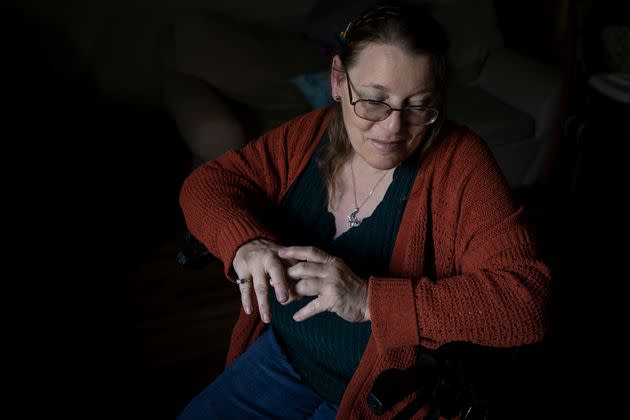Hotel Website's Supreme Court Case Could Shake Up How Disability Law Is Enforced
The Supreme Court is hearing oral arguments on Wednesday in a major case that could affect disabled individuals’ rights to sue a place of public accommodation for failing to provide accessibility information on its website.
The case, Acheson Hotels LLC v. Laufer, came about after the plaintiff, Deborah Laufer, a disabled Florida resident, filed a lawsuit in 2020 against Acheson Hotels LLC, a hotel operator based in Maine, alleging that one of its hotels did not have sufficient information available about the establishment’s accessibility features on its website or reservation system.
Under Title III of the Americans With Disabilities Act (ADA), places of public accommodation such as hotels are required to make reasonable modifications to their policies and procedures to ensure that they are accessible to disabled people. In 2010, the federal law was revised with new requirements for hotels and public lodges, which included the requirement that all reservation systems provide accessibility information about the establishment and clear options for reserving accessible rooms on their websites and third-party sites.
The case doesn’t focus on whether Acheson Hotels LLC was in violation of the ADA. This Supreme Court case looks at the legal standing that Laufer has, as a self-appointed ADA “tester,” to challenge the establishment for lack of compliance with the federal disability law.
“This is not a fight over whether or not the law was broken,” Michelle Uzeta, deputy legal director of the Disability Rights, Education and Defense Fund explained to HuffPost. “It’s a fight over whether or not a disabled person acting as a tester should be able to challenge that discrimination in court.”
The Need For Civil Rights Testers
Civil rights testing is a tool used to enforce civil rights by investigating whether discrimination is taking place in housing, employment, public accommodations ― such as in Laufer’s case ― and in government services. A civil rights tester is a person who pursues these investigations, posing as a person interested in purchasing or engaging in the services, to challenge that discrimination.
A tester is only eligible to file a federal claim — known as tester standing — if they find proof of discrimination and injury. When they reach a point of tester standing, they are legally eligible to bring forward claims in a lawsuit and seek relief in court.
In the lawsuit, Acheson Hotels put Laufer’s tester standing — and her eligibility to sue — into question.
“Testing is used to enforce a number of different civil rights laws. It recognizes that people are injured by discrimination by exclusionary conduct, especially in regard to places of public accommodation,” Uzeta explained. “There’s a long history of case law like that, and a long history of the Supreme Court recognizing injury like that as sufficient to sue.”
Laufer is a self-appointed ADA tester, which means that she goes on to hotel websites and reservation systems to see whether they have information available on the establishment’s accessibility features, per ADA requirements, and pursues legal action against them if they are not in compliance — regardless of whether she intends to visit.

As a "tester," Deborah Laufer investigated the websites of hundreds of hotels to determine whether they included accessibility information required by the Americans with Disabilities Act.
Laufer has filed over 600 lawsuits against hotels and chains alleging that their websites were insufficient in providing information about the hotel’s accessibility features. In the case presented to the Supreme Court, Laufer did not visit the hotel operated by Acheson Hotels or have any plans to do so.
A district court had initially dismissed Laufer’s lawsuit against Acheson Hotels, deciding that she was not injured by the absence of information on the hotel’s website since she never planned to visit, and therefore did not have standing to sue. But the decision was reversed by the First Circuit Court of Appeals.
“Laufer’s feelings of frustration, humiliation, and second-class citizenry [are] ‘downstream consequences’ and ‘adverse effects’ of the informational injury she experienced,” the appeals court said.
In a petition filed in November 2022, Acheson Hotels argued that Laufer’s “abstract desire to ensure compliance with federal law does not give her Article III standing” to sue the hotel since she had no intention of visiting it. They brought the case to the Supreme Court, which agreed in March to take up the case to decide whether Laufer can sue as a civil rights tester.
In August, 18 disability rights organizations filed an amicus brief asking for the rights of disabled individuals to sue under the ADA to be upheld, arguing that testers are vital to the enforcement of the ADA.
“When you visit a website and a reservation system, and you seek to access information so you can explore going on a trip or a vacation, if information that’s legally required to be there is not there, it sends the message that we don’t value your patronage, [and] you’re not welcome here,” Uzeta explained.
She continued: “That kind of message is a harm. It’s a harm to one’s dignity. It’s exclusion, it’s discrimination. And it does create the kinds of feelings and injury that have been recognized by the courts for many, many years, as sufficient to give you the right to sue in court.”
The Case Could Weaken ADA Enforcement
Compliance with the ADA is enforced through complaints filed to government agencies and departments, with the Department of Justice handling those involving places of public accommodation, such as hotels. From there, the department might either refer the person raising the complaint to another agency, or to a program that can facilitate mediation. In some cases, the department may investigate the issues raised in the complaint, which could lead to a lawsuit or settlement.
“Congress recognized that the government — and here we’re talking about the Department of Justice — is too under-resourced to undertake regular and meaningful enforcement of the millions of businesses that exist nationwide,” Uzeta said. “So they made a conscious choice to make private enforcement the primary method of obtaining compliance.”
Testers serve to “bridge the gap” in trying to hold establishments accountable for ADA violations, Uzeta said, noting that the threat of a federal lawsuit acts as an incentive for businesses to comply with the law.
The Justice Department affirmed that testers do fill a need, noting in its amicus brief on the Acheson Hotels v. Laufer case that private lawsuits, including those from testers, are “an essential complement to the federal government’s enforcement” of Title III of the ADA and other anti-discrimination laws.

The average disabled person who experiences discrimination from a private establishment is more likely to let it go rather than file an ADA lawsuit due to the costly, time-consuming and stressful nature of the process, as well as the risks.
But some businesses, including Acheson Hotels, say that these lawsuits can be predatory.
Acheson Hotels had also stated that many hotels, including their own, are small businesses that do not have in-house counsel or may be unaware of their requirement to provide accessibility information on their website.
“Ignorance of the law is no excuse. But there are often better ways of ensuring compliance with the law than filing a lawsuit,” the company wrote in a brief.
“A simple phone call reminding a hotel owner of its obligations may be more appropriate — and more likely to ensure that disabled persons receive the information they need — than [hauling] the hotel owner into court,” Acheson Hotels continued.
According to The New York Times, the ADA was written in a way that limits plaintiffs’ ability to receive monetary damages in ADA lawsuits — an intentional choice that lawmakers made to address the concern of there being a financial incentive to sue under the ADA. Still, they can receive financial compensation in certain states that have codified their own version of the ADA, such as California, Florida, Pennsylvania, Illinois and New York.
Defendants in ADA lawsuits have had to pay for legal fees in such cases, which can be steep given the months of legal procedures.
The ADA was passed 33 years ago…there really should be no excuse at this point for not complying with the law.Michelle Uzeta, deputy legal director of the Disability Rights, Education and Defense Fund
Although abuses of the system have the potential to occur, Uzeta says that businesses who accuse the lawsuits of being predatory are trying to villainize disabled people who are just trying to hold businesses accountable.
According to Uzeta, the average disabled person who experiences discrimination from a private establishment is more likely to let it go rather than file an ADA lawsuit due to the costly, time-consuming and stressful nature of the process, as well as the risks.
While Acheson Hotels is accusing people of using ADA lawsuits to target small businesses, Uzeta points out that there is a relatively small number of firms and plaintiffs filing these lawsuits.
There were 8,694 lawsuits filed in federal court in 2022 alleging a violation of Title III of the ADA, marking a decrease of 24.1% from the previous year, according to Seyfarth Shaw LLP, a law firm that handles ADA discrimination cases.Similarly, disability organizations found that ADA cases made up only an average of 2.2% of the federal civil filings since 2008, based on data published by the Administrative Office of the U.S. Courts.
“The ADA was passed 33 years ago…there really should be no excuse at this point for not complying with the law,” Uzeta said.
While it’s too soon to say how the Supreme Court will rule in this case, Uzeta and other disability experts are concerned about what this could mean for the future of ADA enforcement.
“It’s undoubtedly going to result in less enforcement of the ADA and a more inaccessible community, and businesses will be emboldened to continue to flaunt their requirements,” Uzeta said. “Without the threat of any enforcement now, or with significantly reduced enforcement, there’s absolutely no incentive for businesses to comply with the law.”
